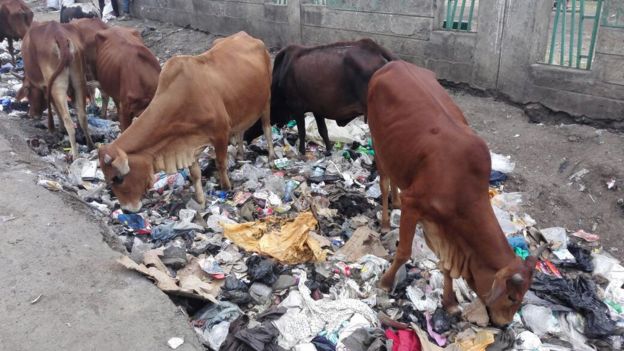A ban on plastic carrier bags has come into force in Kenya, which means that anyone found selling, manufacturing or carrying them could face fines of up to $38,000 or prison sentences of up to four years.
The government says the ban will help protect the environment.
But manufacturers of the bags have argued that 80,000 jobs could be lost.
A court on Friday rejected a challenge to the ban. Kenyans are estimated to use 24 million bags a month.
A number of other African countries have outlawed plastic carrier bags, including Rwanda, Mauritania and Eritrea.
Piles of waste plastic bags are a common site across Kenya, as in many African countries.
Animals often graze on the rubbish and the United Nations' Environment Programme says huge amounts of polythene bags are pulled out of livestock in Nairobi's abattoirs - as many as 20 bags per cow - raising fears of plastic contamination in beef.

Cows in Kenyan abattoirs are often found with plastic bags in their stomachs
Kenya's Environment Minister Judy Wakhungu says the plastic bags take between 20 and 1,000 years to biodegrade.
"Plastic bags now constitute the biggest challenge to solid waste management in Kenya. This has become our environmental nightmare that we must defeat by all means," she told the BBC.
The BBC's Anne Soy in Nairobi says that supermarkets appear to have adjusted - they are selling fabric bags for 10 Kenyan shillings (10 US cents; 7 British pence).
However, traders in the City meat market are still using plastic bags, she says.
Travellers coming into Kenya with duty-free plastic shop bags will be required to leave them at the airport under the new rules, the National Environmental and Management Authority has said.
This is the third attempt in the past 10 years to ban plastic bags in Kenya.
The government had given a six-month window for adjustment which expired on Sunday night.
Manufacturers who use polythene to wrap products are exempted from the ban.
In its ruling last week, the High Court dismissed a case filed by two plastic bags importers urging it to drop the ban. The court ruled that environmental concerns were more important than commercial interests.
Research in Europe has shown that a paper bag must be used three times to compensate for the larger amount of carbon used in manufacturing and transporting it.
Likewise a plastic "bag for life" must be used four times, and a cotton bag must be used 131 times.
Latest Stories
-
Involve TEWU in review of free SHS – TEWU tells gov’t
3 minutes -
Revolutionising education through the metaverse: The case for AI Labs in African tertiary institutions
13 minutes -
I’ve never said scrapping e-levy, betting tax will violate IMF programme – Gideon Boako
19 minutes -
Man jailed 3 years for impersonation and possession of military uniforms
30 minutes -
I want to do collaborations with Sarkodie, Stonebwoy, Shatta Wale – Joyce Blessing
35 minutes -
President Mahama to engage Asantehene on Jan. 19 over Bawku conflict
42 minutes -
TEWU calls on gov’t to address abuse of university governing councils
50 minutes -
Private schools eager to join Free SHS programme – Minority to Mahama, Ato Forson
57 minutes -
Promasidor Ghana kickstarts 2025 with strategic sessions
59 minutes -
Full text: Minority statement on vetting of 3 nominees, other matters
1 hour -
Behold, newness all over: New Year, new regime, new Parliament; looking forward with great expectations
1 hour -
Joyce Blessing recounts how a gospel artiste turned down her feature request
1 hour -
Ato Forson’s responses on revenue shortfalls spark fears of harsher taxes – Minority
1 hour -
Absa Bank supports Kantamanto traders with GH¢150,000
1 hour -
GPL: Ibrahim Tanko leaves Accra Lions after three years
2 hours

